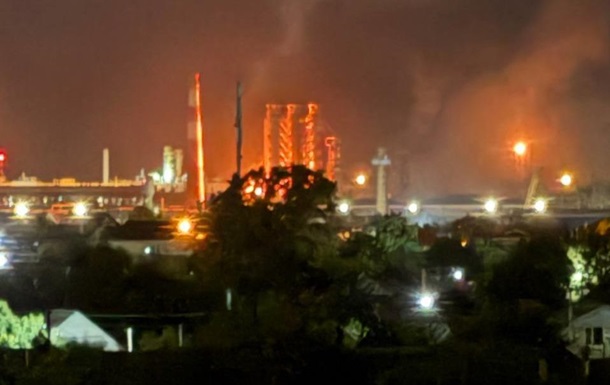Afip refinery on fire: drones attacked one of the key links in Russia’s fuel infrastructure
26 September 14:56
On the night of September 26, drones attacked the Afip oil refinery in the Krasnodar region of Russia. According to the official data of the operational headquarters of the Russian region, the wreckage of one of the drones fell on a technological installation, which caused a fire of about 30 square meters, "Komersant Ukrainian" reports.
“There are no casualties. The fire has been extinguished, operational and special services are working at the scene,” the headquarters said in a statement.
Local Telegram channels posted a photo with smoke over the company.
What is known about the facility
The Afip refinery is part of the Safmar group and is one of the key refineries in the region. Its design capacity is 6.25 million tons of oil per year. This is not the first time that the refinery has been targeted by drone attacks, which are regularly directed against Russia’s fuel infrastructure.
Context of the attacks
Only a week ago, on the night of September 20, units of the Unmanned Systems Forces of the Armed Forces of Ukraine, in cooperation with other components of the Defense Forces, attacked the Saratov and Novokuibyshevsk refineries. As a result, according to Ukrainian sources, some of the equipment was disabled and fuel supplies were disrupted.
Such strikes are increasingly becoming a tool to put pressure on Russia’s military-industrial and energy potential.
Wider dimension
Attacks on oil refineries in the interior of Russia have become systematic – their geography extends from the Krasnodar Territory to the Volga Region. This puts additional pressure on the Russian economy, as the fuel sector is critical for financing the war and providing logistics for the army.
Experts note that even a partial shutdown of large refineries can affect the volume of petroleum product exports, domestic prices and budget revenues.
As a reminder, in early 2024, more than 40 drone attacks on fuel infrastructure facilities were recorded in Russia.
The largest attacks were on refineries in Tatarstan, Nizhny Novgorod region and the Urals. Analysts note that Moscow is forced to redeploy some air defense units from the front to cover strategic enterprises in the rear, which may weaken its defense capabilities on the front lines.
The attack on the Afip oil refinery fits into the trend of systemic pressure on Russia’s fuel infrastructure. Despite official statements about “minor consequences,” the regularity of such incidents shows that it is increasingly difficult for Russia to guarantee the security of its strategic assets.









